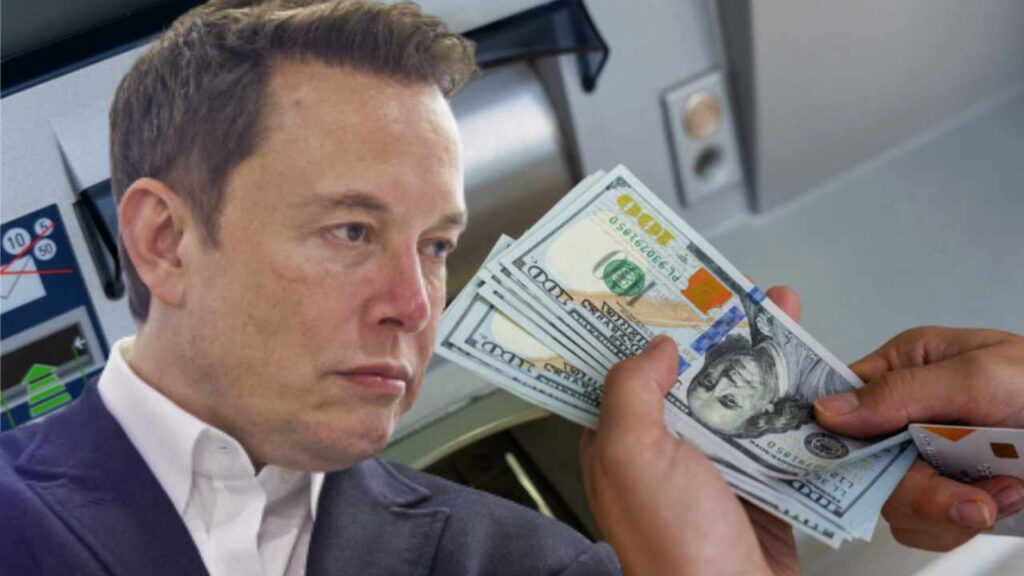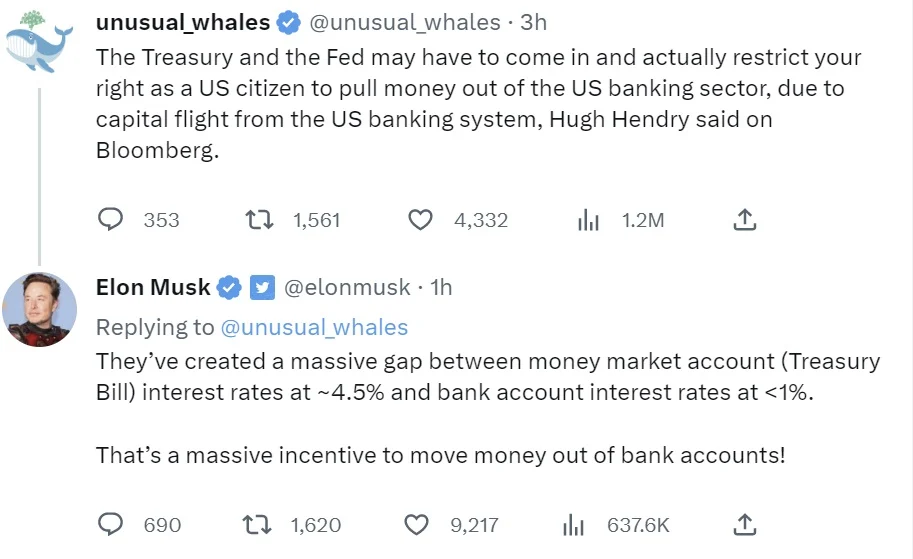
Elon Musk, the CEO of Tesla and Twitter, has unveiled a compelling reason to consider moving funds out of traditional bank accounts. He highlights the substantial interest rate disparity between the U.S. Treasury and the Federal Reserve as a “massive incentive.” Musk cautions that as individuals and businesses become aware of this discrepancy, there may be a rapid increase in the flight of bank depositors, including those associated with institutions deemed “too big to fail.”
Elon Musk recently responded to a Twitter user’s comment about potential restrictions on withdrawing money from the U.S. banking system. Musk shared a “massive incentive” for people to consider moving their funds out of bank accounts in the country. He pointed out the significant interest rate disparity between money market accounts (Treasury Bills) with an interest rate of approximately 4.5% and bank accounts with interest rates below 1%. Musk emphasized that this substantial gap provides a compelling reason for individuals to explore alternative options for their money.

Elon Musk has been vocal about this issue in the past. On May 2, he responded to a tweet discussing a “liquidity crisis” and the flow of cash into Treasury money market accounts offering a 4.5% interest rate. Elon Musk expressed his concern, highlighting the illogicality of keeping money in a bank account with an interest rate below 1% when higher rates are available in money market accounts like Treasury Bills. He further warned that as more individuals and companies recognize this disparity, the flight of bank depositors will intensify, even affecting institutions considered “too big to fail.”
Elon Musk also concurred with Genevieve Roch-Decter, a former money manager, who tweeted about banks deceiving depositors by offering a mere 0.4% interest on savings while reaping profits of over 5% on treasuries. Roch-Decter emphasized that the most significant risk for banks lies in consumers realizing that they can withdraw their funds from banks and invest in treasuries or money market funds directly.
Concerns have been raised regarding the state of the U.S. banking sector, with recent incidents highlighting potential issues. Last week, First Republic Bank was seized by regulators and its assets were mostly acquired by JPMorgan Chase, marking the second-largest bank failure in the country since 2008. Additionally, Silicon Valley Bank and Signature Bank also faced failures in March. Despite these events, Federal Reserve Chairman Jerome Powell reassured that the banking system remains “sound and resilient,” even as interest rates were increased by 25 basis points by Fed officials.
A strategist from Swedbank has issued a warning, suggesting that the U.S. banking crisis is spreading and cautioning about the possibility of further bank failures leading to a detrimental spiral. Billionaire Bill Ackman has also expressed urgency in addressing the banking problem before it escalates. Furthermore, the Fed disclosed that in the third quarter of the previous year, 722 banks reported unrealized losses exceeding 50% of their capital, indicating potential vulnerabilities in the sector.
During an interview with Bloomberg on Thursday, Hugh Hendry expressed a negative view of the U.S. banking system, describing it as “real bad.” The former hedge fund manager emphasized that the announcement of federal insurance for deposits does not address the underlying problem. He noted that there is a capital flight, with deposits being withdrawn from the banking sector in search of higher yields. Hendry went on to caution that he could envision a scenario where a federal or Treasury rule is implemented, restricting the ability to withdraw money from the banking sector for a specific period of time, such as 180 days.



